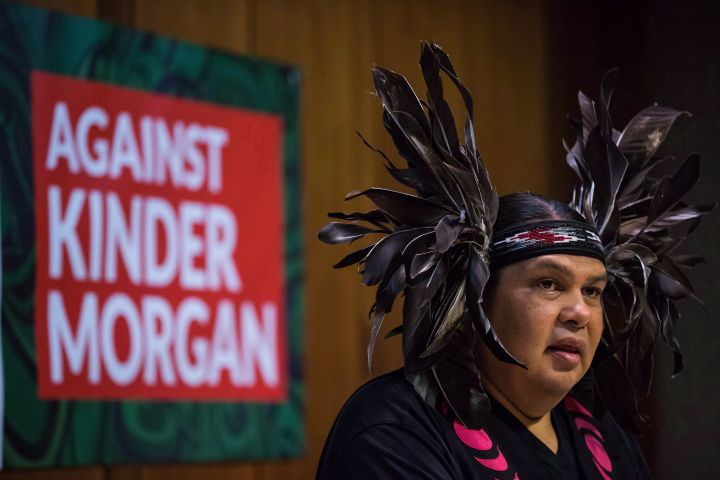The Trans Mountain pipeline expansion is once again being challenged in court.

Multiple legal challenges have been filled by the Tsleil-Waututh Nation, Squamish Nation, Ts’elxweyeqw tribes, Shxw’owhamel Nation, Coldwater Indian Band and Stk’emlupsemc te Secwepemc Nation.
The cases argue “multiple significant legal deficiencies” with the federal cabinet approval of the project. The First Nations believe that a victory on any of the legal grounds would be enough to quash the current approval and send the pipeline back to the drawing board.
“Tsleil-Waututh Nation participated in consultation in good faith again, but it was clear that Canada had already made up their mind as the owners of the project,” Tsleil-Waututh Nation Chief Leah George-Wilson said.
“They repeated many of the same mistakes again, and any changes were window dressing.”
WATCH BELOW: (Aired July 4, 2019): Trudeau says Canada looking at Indigenous ownership of Trans Mountain ‘in measured way’

The federal government re-approved the pipeline in June after launching consultation with Indigenous communities. The National Energy Board also conducted new hearings and ultimately gave the project the thumbs up for the second time.
The legal filings from the First Nations argues there were constitutional violations, primarily around the failure to satisfy the duty to consult, accommodate and seek consent from First Nations. The lawsuits also allege regulatory legal errors were made by the National Energy Board.
“The Trudeau government keeps pushing an oil pipeline project no matter the cost or impacts. The Trudeau government is trampling the Indigenous Rights of the Squamish People with their second approval of the Trans Mountain Expansion Project,” Squamish Nation Councillor and Spokesperson Khelsilem said.
“The Squamish Nation will seek to challenge the Federal government’s disregard for Aboriginal rights protected in the Canadian Charter.”

Get daily National news
It is uncertain when a court decisions will be made, but the applicants anticipates hearing back within a few months. The previous leave application took two months to be decided.
READ MORE: Ottawa won’t rush into sale of Trans Mountain pipeline to Indigenous groups: Sohi
First Nations communities are divided on the project. There are two groups led by Indigenous communities that want to purchase and operate the existing pipeline from the federal government, with the intention to expand it.
There are other First Nations arguing that the pipeline would destroy significant spiritual and historic sites as well as important aquifers, impeding their ability to practice their culture and exercise Aboriginal rights.
“Shxw’owhamel challenges this approval to ensure that our sacred site is not desecrated. Sto:lo, Canadian and international law will be violated if the pipeline route remains aimed at our historical village and burial grounds,” Shxw’owhamel First Nation council member Si:yam Shane James said.
On Monday, lawyers from Ecojustice launched a legal challenge against the federal government.
Ecojustice filed the suit on behalf of environmental groups Raincoast Conservation Foundation and Living Oceans Society. The groups were part of the legal challenge that won their first case in August 2018, when the Federal Court of Appeal struck down cabinet’s previous approval of the project.
WATCH BELOW: (Aired June 25, 2019) : The goal to create a $100B Indigenous economy

The group is arguing that cabinet failed to comply with its responsibility to protect critically endangered southern resident killer whales when it re-approved the project.
“Cabinet cannot justify approving a project that will lead to the extinction of a critically endangered population— legally or morally,” Ecojustice nature program director Margot Vernon said.
“The government itself says endangered southern resident killer whales face imminent threats under their current conditions. This iconic population simply cannot handle increased, unmitigated threats from the Trans Mountain expansion.”
The federal government is confident it will be able to win any legal challenge.
At the time of re-approving the expansion, officials acknowledged “it’s likely there will be challenges” and that the situation is “unprecedented.” But there is also confidence there will be shovels in the ground this year along parts of the route.
The First Nations groups launching the legal challenge believe the consultation teams failed to engage in meaningful dialogue about specific and focused concerns about the TMX Project.
The court documents filed on Tuesday lay out an argument that oil spill likelihood, behaviour and impact as well as concerns around re-routing have not been addressed.
“The federal government has again failed to respond to the concerns we have been raising in regards to this project. This feels like déja vu. We have no choice but to appeal again and we expect the same results — the approval of the Trans Mountain pipeline will be overturned,” Chief George-Wilson said.
READ MORE: Canada’s Indigenous pipe dream might end Trudeau’s Trans Mountain nightmare
The suit also lays out alleged regulatory errors. The First Nations are planning to argue in court that the National Energy Board failed to once again to correctly scope marine shipping.
In particular, the suit alleges, the NEB limited their review to 12 nautical miles instead of the 200 nautical mile Exclusive Economic Zone, contrary to the requirements of the Canadian Environmental Assessment Act 2012.








Comments